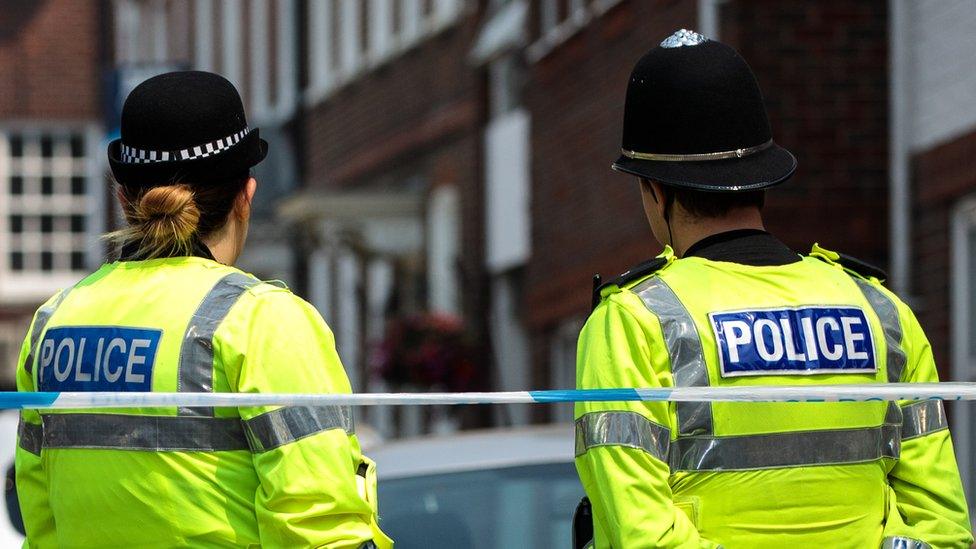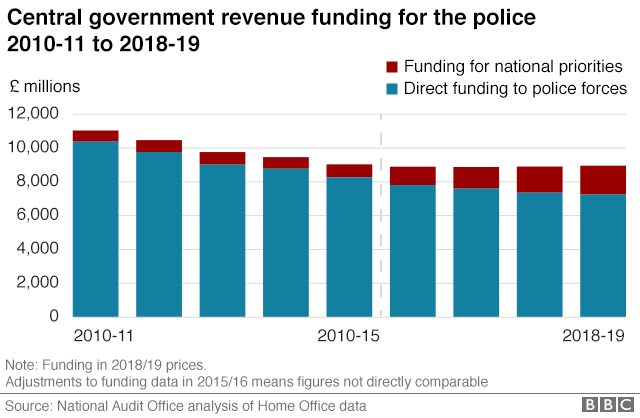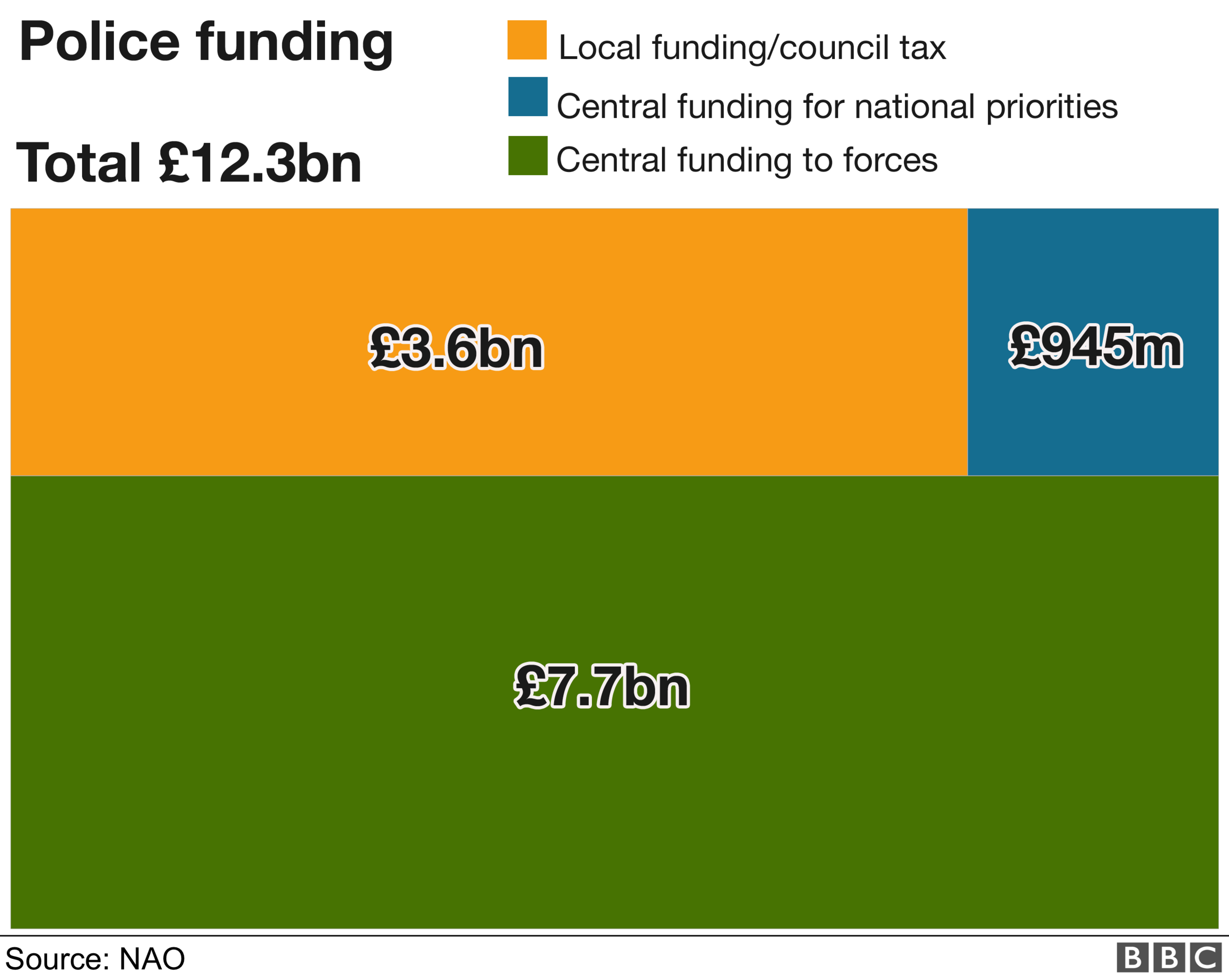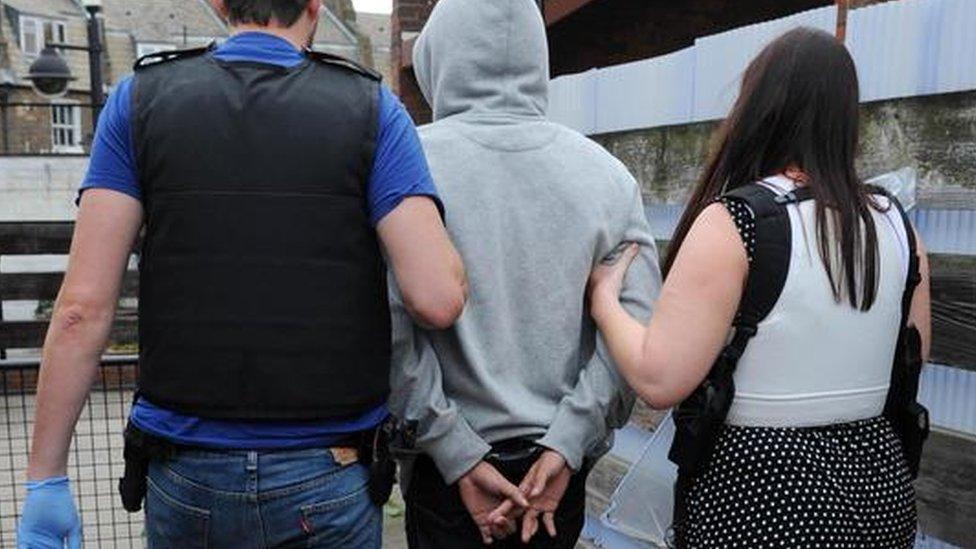Police funding: Ministers 'unaware of cuts impact'
- Published
- comments

Ministers do not know the impact that funding cuts have had on police forces, the UK's public spending watchdog says.
According to the National Audit Office, external, the Home Office does not know whether the police system in England and Wales is "financially sustainable".
It calls the approach to police funding "ineffective" and "detached" from the changing demands faced by officers.
A Home Office spokesman said the department had conducted a substantial review of police pressures last year.
However, the Home Office had not even forecast the effect of losing 44,000 police officers and staff since 2010, the NAO said.
Since September 2009 - the last set of Home Office figures before the Conservatives came into government - there has been a cut of 22,424 police officers.
There were 126,252 police officers in England and Wales in September 2017, according to the latest figures.
Historically there have been fewer officers - with 123,474 in 2001; 125,453 in 1991; and 116,544 in 1981, for example.
Officer numbers grew during the Labour government from 2002 onwards, peaking in 2009.

The report found:
It took 18 days to charge an offence for the year ending March 2018 - four days longer than for the year ending March 2016
The arrest rate fell to 14 arrests per 1,000 population in 2016-17, down from 17 per 1,000 population in 2014-15
There have been fewer breathalyser tests, motoring fixed penalty notices and convictions for drugs trafficking and possession since 2010
33% of victims were not happy with police response in the year ending March 2018, up from 29% in the year ending March 2016

Met Police commissioner Cressida Dick told the annual conference of the Police Superintendents' Association that the force had faced "unprecedented challenges", noting that some officers are working "longer and harder".
"This is not a service that needs reform, this is a service that needs support and needs resources... the NAO report shows this," she said.
Durham's chief constable Mike Barton said the decisions of Home Office ministers in regards to police funding were "sometimes in the hands of the Treasury".
"I actually think the cuts in 2010 were the wake up call that policing needed to say: 'Come on spend your money wisely'," Mr Barton told BBC Breakfast.
But he said there had been a "constant strain" since then with "austerity dragging out".
Mark Burns-Williamson, police and crime commissioner for West Yorkshire, told BBC Radio 4's Today programme the report highlighted what other PCCs had been saying "for some time".
Firstly, that the overall amount of funding for policing "isn't enough" - and secondly that the funding formula was "not really fit for purpose", leading to "unfairness and differences" between different areas.
Home Affairs Select Committee chair Yvette Cooper said MPs had repeatedly heard about police forces being overstretched, calling the report "very accurate" and "damning".
The Labour MP told the BBC it showed an "irresponsible approach from the Home Office" in making "substantial cuts" in the police budget "without appearing to have any clear idea about what the impact of those cuts are".
The NAO report comes as Home Secretary Sajid Javid prepares for a speech to police superintendents in which he will say the police must be equipped for a changing landscape.
On Monday, the leader of the superintendents' association warned the service was on the verge of a crisis.
Allow X content?
This article contains content provided by X. We ask for your permission before anything is loaded, as they may be using cookies and other technologies. You may want to read X’s cookie policy, external and privacy policy, external before accepting. To view this content choose ‘accept and continue’.

Police forces in England and Wales are funded through a £12.3bn combination of a central grant to each police and crime commissioner, as well as additional cash raised locally through the council tax and one-off grants for special projects.
The NAO says the amount coming from the government is down 30% in real terms since 2010-11.

Check crime in your area (figures 2014 - 2017)

The NAO's Tom McDonald said the Home Office "does not really understand the nature of the demand" facing police forces.
He said the funding formula used to allocate money was "out of date", three years after the Home Office told Parliament that the formula was ineffective.
"It's unlikely that the money is going to the right places," he said. "We have real concerns about it."

Analysis
By Dominic Casciani, Home Affairs Correspondent
This report from the national spending watchdog paints a picture of a service on the front line of public protection under severe pressure - but nobody in government being entirely sure how much pressure it is really under. The assessors said that while no force was about to financially fail, the stress was apparent.
Since two years ago, officers are taking four days longer to charge suspects - an indication of workload rather than rising crime - and there is less "proactive work", such as motorway stops of dangerous drivers, breathalyser tests and convictions for drug possession.
The rolling national crime survey has charted rising dissatisfaction with the police - and many communities have campaigned against losing local cuts. Two cities - St Albans and Bath - no longer have a dedicated police station with a front desk.


A Home Office plan to revise the police funding formula, to more fairly distribute funds, was mothballed following the June 2017 general election.
The NAO said individual forces had been developing their own ways of predicting demand for their services but the Home Office itself had "no overarching strategy for policing".
But a Home Office spokesman disputed some of the NAO's findings - saying it had "a strategic direction" and last year conducted a substantial review of police pressures.
"Our decision to empower locally accountable police and crime commissioners to make decisions using their local expertise does not mean that we do not understand the demands on police forces," said the spokesman.
"The report does not recognise the strengths of PCCs and chief constables leading on day-to-day policing matters, including on financial sustainability.
"We remain committed to working closely with police and delivered a £460m increase in overall police funding in 2018/19, including increased funding for local policing through council tax," the spokesman said.

- Published19 July 2018

- Published16 May 2018
